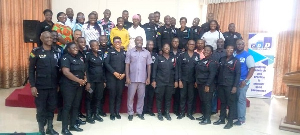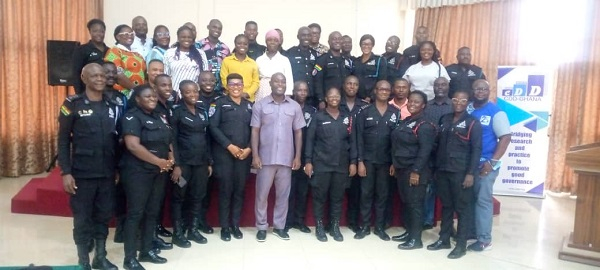 40 selected officers from three Divisions in the Eastern Region participated in the forum
40 selected officers from three Divisions in the Eastern Region participated in the forum
Police personnel from three divisions in the Eastern Region convened for a day-long forum dedicated to fostering responsible policing. The Centre for Democratic Development (CDD-Ghana) collaborated with the Ghana Police Service in Koforidua to advocate for lawful policing practices rooted in ethical accountability and public responsibility.
40 selected officers from the Koforidua, Akropong, and Akosombo Divisions in the Eastern Region participated in the forum aimed at addressing concerns bordering on human rights and minority rights.
Addressing the participants, Dr Michael Augustus Akabor, Programmes Officer at CDD-Ghana, elaborated on the pragmatic implementation of human rights and the necessity of incorporating minority rights considerations into policing practices.
Emphasising that CDD-Ghana’s mission encompasses the promotion of good governance, inclusive development, and democratic accountability throughout Ghana and the African continent, he asserted that it is imperative for law enforcement agencies to adopt a quality management system that would ensure consistency, equity, and enhanced efficacy in the execution of their duties.
Dr Akabor highlighted the importance of respecting the rights of all individuals, regardless of how their groups are recognised. This is emphasised by the recognition of ongoing human rights concerns within the Ghana Police Service, specifically regarding unlawful arrests, detentions, and alleged brutality, according to CDD-Ghana, whose mission includes promoting good governance, inclusive development, and democratic accountability.
Dr Akabor stated that law enforcement officers must uphold fairness and impartiality in their duties, particularly where minority groups, including those identified as Lesbian, Gay, Bisexual, Transgender, and Queer, even within a legal context that remains largely unsupportive of such identities in Ghana.
He stated: “The fact that the status of some groups is narrowly recognised does not mean they are to be denied their rights. The rights of every individual must be respected.”
Superintendent Ebenezer Tetteh, Eastern Regional Public Relations Officer, speaking on behalf of the Ghana Police Service, acknowledged the ongoing human rights concerns confronting the police institution, including unlawful arrests, detentions, and alleged brutality.
He explained that the orientation was designed to reach select officers who would in turn promote lawful and rights-respecting practices among their peers.
Professor Kwadwo Appiagyei-Atua, a Professor of International Law at the University of Ghana School of Law, highlighted that while criminal law and fundamental human rights are interconnected, they also serve as checks on each other, preventing both state overreach and misuse of individual rights.
Addressing the legal complexities between Criminal Law and Fundamental Human Rights, he explained that although the two were interconnected, they also acted as checks on each other to prevent both state abuse and misuse of individual rights.
Furthermore, he observed that law enforcement often placed undue emphasis on Criminal Law to the neglect of rights-based obligations. “We’re talking about the fact that the Police owe duties to citizens, but sometimes their responses to the issues of particular people, including the LGBTQ community, are discriminatory,” he said.
Professor Appiagyei-Atua urged the Police to uphold their constitutional duty to protect all people equally, without prejudice or bias.


